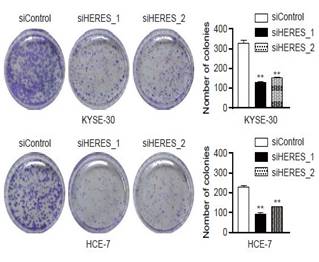Korean researchers said they have found a new gene that controls the development of esophageal squamous cell carcinoma (ESCC), intractable cancer in the esophagus. The finding is likely to allow researchers to develop a diagnostic platform and a treatment agent for esophagus cancer.
The research team, led by Professor Lee Sang-kil at Yonsei Institute of Gastroenterology at Yonsei University College of Medicine and Professor Nam Jin-wu at the Department of Life Science at Hanyang University, said they identified a long, non-coding RNA (lncRNA) involved in the development of ESCC.

Esophageal cancer is mainly caused by smoking and drinking, and the majority of domestic esophageal cancer is ESCC, which is difficult to treat. Squamous-cell carcinoma is also frequently found in head and neck cancer and lung cancer, but it is considered intractable cancer because there are not many treatment targets.
The research team earned samples of cancer tissues from 23 patients with ISCC and analyzed their RNA using Next-Generation Sequencing. The study found that the patients’ cancer tissues had more IncRNA, called Highly Expressed noncoding RNAs in Esophageal Squamous cell carcinoma (HERES) than regular issues. The findings were for the first time in the world, they said.
Also, animal testing of squamous-cell carcinoma cell lines showed that the growth of cancer cell lines was reduced when HERES was inhibited.
“The discovery of the lncRNA gene, HERES, confirms the possibility of cancer treatment using the DNA non-coding area, which is a hot issue now,” Lee said. “This study can contribute to the development of predictive markers and targeted therapies for squamous-cell carcinoma found not only in esophageal cancer but in head and neck cancer and lung cancer.”
The Ministry of Science and ICT supported the study, the Basic Science Research Program through the National Research Foundation (NRF), the Bio and Medical Technology Development Program, and the Korean Health Technology R&D Project under the Ministry of Health and Welfare.
The research was published in the latest issue of the Proceedings of the National Academy of Sciences.
The research team also earned a patent on “Pharmaceutical composition for preventing or treating squamous-cell carcinoma, including HERES expression inhibitor.”

